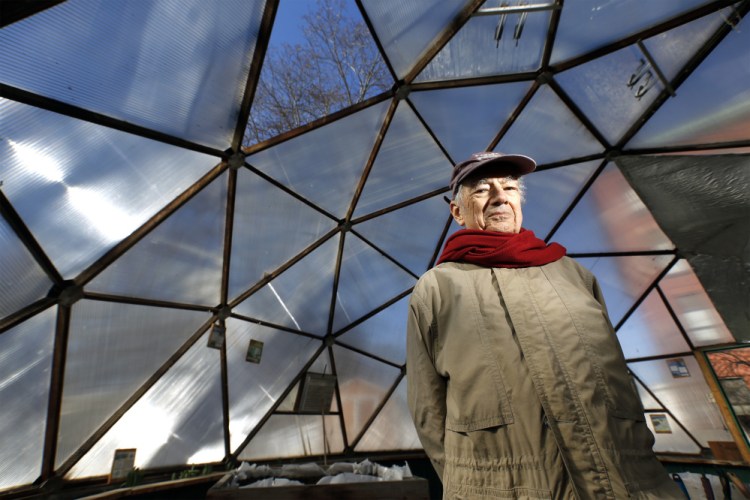Alfred Padula walked up to the idling car. He knocked on the driver’s side window. The guy inside rolled down the window.
Padula could have said, “Hello, I am a professor emeritus from the University of Southern Maine, where I taught history for nearly 30 years. I am an expert on Cuba and Latin America, but in my retirement I have become very focused on the planet’s future. I’ve given solar panels to USM, started a teaching sustainability initiative there and regularly fund solar projects at Portland public schools.”
He could have thrown in founding and co-chairing the Maine Green Campus Consortium, a collective of students and sustainability coordinators from across the state who meet bi-monthly to share ideas on how to make campuses greener.
He did not.
“I just said, ‘Climate change.’ ”
The man in the idling car told Padula it was none of his damn business.
“That is the attitude of a fair lot of people, who don’t see that they are part of a community which is suffering from the impact of careless waste of fuel,” Padula said.
But he soldiers on, buoyed by the sense that the tide has turned (the Trump administration aside) and that awareness of climate change is increasing in America.
Sandra Wachholz, a friend and professor at USM, nominated Padula, who goes by Fred, for the Elder Award. She ticked off a list to describe him: environmental educator, philanthropist, activist. “These are all lofty words,” she wrote. “But the difference between Alfred Padula and many people is that those words have been backed up consistently by action. And usually many years before the rest of the community fully appreciated the importance of what he was extolling.”
Originally from South Orange, New Jersey, Padula joined the Navy after graduating from Holy Cross College and then went into intelligence. This landed him at the National Security Agency. Just after the Cuban Missile Crisis, he became “the Cuban man” in the State Department’s Bureau of Intelligence and Research. Cuba was a longstanding obsession. He wrote a book about women in Cuba. He traveled there five or six times, spending, he says, about a year there. He taught Cuban history at USM. Then one day, while he was poring over a newspaper story about a trip Raul Castro had taken, he hit a wall. “I said, ‘This is enough.’ ” He was done with Cuba.
His interest in environmentalism goes nearly as far but has only grown. He was in graduate school in New Mexico when a friend took him to a pueblo-style village under construction. He saw jerry-rigged solar heating systems involving barrels of water being heated by the sun, met people living off the grid. Later, when he was teaching at USM, he began to push the idea that the university, and others, should be leaders, environmental stewards.
He became a philanthropist after receiving an inheritance. His father had been an attorney who made smart business investments on Long Island, breaking up big properties and selling off house lots. Padula decided to put that money to work making positive change. One of his early investments was on a proposed wind power project, the Redington Wind Farm in Franklin County. The project was a novel idea to a lot of people, hit many roadblocks, including opposition from Maine Audubon, and failed in 2008.
But he had plenty of other projects to turn to. He donated the photovoltaic panels on the Abromson Community Education Center at USM. He put solar on his own roof near Back Cove in Portland. When he reads about the various defeats solar power encounters legislatively in Maine, he’s dismayed. “We have a huge way to go. But progress comes in mysterious ways.” He’s helping USM move toward carbon neutrality. When he sees a need at a Maine company working on environmental issues, he might make a quiet gift, like one to Efficiency Maine for infrared heat monitors or funding a project for the nonprofit Cultivating Community, which works with recent immigrants.
And he’s practically made a second career out of energy-testing homes and local institutions. He’s advocated for putting a second layer of doors in Portland schools to retain heat. “The kids would open the doors, and the wind would come flying in.” Padula has his eye on City Hall in Portland – he knows it’s not energy efficient.
“I went in there with my temperature gun,” he said. “The heat loss was out of control.”
If he could wave a magic wand, he’d create a mandatory order for home energy inspections to be part of the sales process when homes change hands in Portland; consumers ought to know just what kind of a leaky old house they’re getting. “Needless to say, a lot of people would say this is invasive. That this is none of your business. But it is everybody’s business.”
Which is why he has no fear of knocking on doors – and windows – to offer some wisdom and, quite often, some help.
Mary Pols can be contacted at 791-6456 or at:
Twitter: MaryPols
Copy the Story LinkSend questions/comments to the editors.




Success. Please wait for the page to reload. If the page does not reload within 5 seconds, please refresh the page.
Enter your email and password to access comments.
Hi, to comment on stories you must . This profile is in addition to your subscription and website login.
Already have a commenting profile? .
Invalid username/password.
Please check your email to confirm and complete your registration.
Only subscribers are eligible to post comments. Please subscribe or login first for digital access. Here’s why.
Use the form below to reset your password. When you've submitted your account email, we will send an email with a reset code.